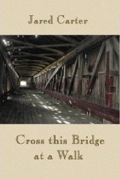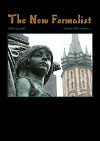R.S. “Sam” Gwynn is one of the most powerful figures in the world of formalist poetry as the editor of various anthologies issued by major publishing houses, anthologies whose tables of contents indicate that he has been good to his friends (debts paid in full).
In 2001, “No Word of Farewell: Poems 1970-2000” was published with an introduction by Dana Gioia, and with praise on its back cover from, among lesser names, two of the most generous and prolific blurbers: Richard Wilbur and X.J. Kennedy. Beyond the formalist ghetto, the book has gone mostly unnoticed, but that is the case with 99.99% of all volumes of metrical verse.
Gwynn writes, by and large, satirical verse, and invariably his irony and wit are from a politically correct point of view. He is a southerner, a good ol’ boy, but not a bad one like George Wallace, who, if we remember, too, eventually buckled under the weight of his own ambition. In this regard, he reminds me of those Confederate deserters, who, in the final days of the Civil War, were hunted down by General Lee’s last remaining soldiers. (Usually they were shot on the spot, and rightfully so, when we consider the atrocities committed by the Yankees—the rapes, the murders, and the burning of Atlanta.) Sam is one of “them yeller-bellies” who escaped by hiding in the bushes (the academic world).
Somewhat related to this is a little known story concerning Nobel Prize winner Czeslaw Milosz (1911-2004) during the tragic Warsaw Uprising (August-September 1944). Even as poet-soldiers were dying (among them the great Krzystof Kamil Baczynski) in a heroic struggle to free Poland’s capitol from the Germans, Czeslaw hid in the cellar of his wife’s brownstone flat. Soldiers from the Polish underground “Home Army” came for him, demanding to know why he refused to fight. “He is too great a poet to die in battle,” his wife answered.
In his three-part sonnet sequence “Body Bags” Gwynn tells the sad tales of three, more or less, losers drafted into military service during the Vietnam War.
In the first, he deals with Dwayne, a high school petty thief, who, in exchange for a prison sentence, is sent to ‘Nam, where he dies.
In the second, he deals, ostensibly, with Dwayne Coburn, a lumbering offensive guard who: “said he’d swap his Harley and his dope/And both balls for a 4-F knee like mine.” The poem is really about alleged star running back Sam Gwynn, the guy Dwayne once blocked for. Gwynn would have us believe that had he not injured his knee he might have been the next Larry Csonka or John Riggens. (Most likely Sam injured his knee carrying water from the bench.) The self-reference, the use of confabulation, self-myth, is a trope often used by his Brokeback Mountain camping and hunting buddy, Tim Murphy (whom he has included in his latest anthology). At the end of the poem, we learn that Dwayne has hanged himself, rather than die in Vietnam, fighting against communism, a system responsible for the death of 90 million people in the 20th century.
In the third, we learn about a Roy Orbison impersonator named Jay Swinney, who on dates with girls, often shows them a wallet picture of his older brother, a marine. Of course, Jay, too, is eventually drafted and dies, while Gwynn stands at the blackboard, with chalk in his hands, in the safety of some university, waiting for tenure, instead of using his considerable poetic talent to write about something that might hurt his career, say about the mass murder committed by the Khmer Rouge, (as Jerry H. Jenkins does so masterfully in his poem “Resurrection”).
Gwynn is a superb versifier and possesses a flawless ear. This is manifest in the exquisite “Release,” an imitation after Longfellow.



